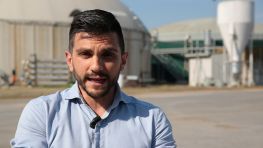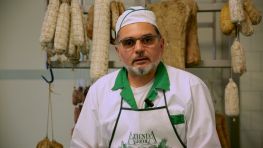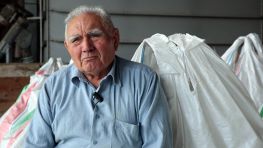 Alessandro Varesio
Alessandro Varesio Maurizio Carucci
The agricultural collective Cascina Barbàn
Maurizio Carucci was born in Genoa in the Marassi district but realizing that life among palaces wasn't what interested him and his partner, he looked for a place that would make them fall in love, a place that "would give them the joy of being there". In Val Borbera they found the hamlet of Cantine di Figino in Albera Ligure and gave birth to the Collective Cascina Barbàn.
They cultivate a historical variety of Val Borbera beans, historical grains and viticulture, made up of small plots with the presence of several varieties in small rows. Lovers of "misticanza" practice it both in the cultivation of grains and in the selection of vines. In addition to Timorasso, the historic variety of the valley, other varieties have also been mapped and selected with the help of an ampelographer, three of which will go into production. Conscious of the close link between the territory, the community that inhabits it and the products of the earth, they have revived a farmer's market and a short bread supply chain.
For Maurizio and the Collettivo Cascina Barbàn, the destiny of the Appennini mountains is to focus on micro-territoriality, on historical varieties, on native breeds. Only thanks to these heritages handed down over the centuries can we succeed in enhancing the small quantities produced by claiming the fact that they are not an industry and thus giving new perspectives to the valley.
Maurizio Carucci is also a well-known singer-songwriter, voice of the musical group Ex-Otago,
Video table of contents
- From Genoa to Val Borbera
- An agricultural project that affects the territory
- A place that made us fall in love: the Cascina Barban collective
- Val Borbera, a severe Apennines
- A mix of languages and flavours
- Community building projects
- Farmer's market
- A short supply chain for bread
- Local products: montebore, timorasso, "fagiolana" beans, meat with herbs, "carla" apple
- We cultivate: historical grains, native beans, historical vines
- Historical grains with adaptability
- Timorasso wine
- Blanding wines: "Cortese" and "Favorita"
- A wine that talks about us and the territory that produces it
- An ampelograph for 3 varieties: mapping the existing
- Abandonment and rebirth of the mountain
- Recover old buildings
- A frost "burned" everything
- Abandoned cultures and reborn cultures: the changing landscape
- Animal traction
- Writing songs, I'm also a musician
Interview information
Country: IT
Region: Piemonte
City: Albera ligure
Urls: Cascina Barbàn, Ex-Otago
Maurizio Carucci
Date of birth: 07-06-1980
City: Genova
School: University
Profession: Farmer
Languages: Italiano
Document by: Luca Ghiardo, Luca Percivalle, Davide Porporato, Gianpaolo Fassino
Video by: Luca Percivalle, Luca Ghiardo, Davide Porporato, Gianpaolo Fassino
Created: 17-10-2017
Questo video fa parte del seguente archivio
Il progetto “Le ragioni della terra. Parole, gesti e storie dell’agricoltura piemontese”, realizzato da Regione Piemonte - Direzione Agricoltura in collaborazione con il Laboratorio “Granai della memoria” dell’Università degli Studi di Scienze Gastronomiche, è stato avviato nella primavera del 2017 con l’obiettivo di individuare, selezionare e raccogliere testimonianze rappresentative della complessità e diversificazione territoriale, culturale e imprenditoriale del sistema agricolo piemontese.
Il metodo che ha portato all’individuazione dei soggetti da intervistare, sulla base dell’esperienza di indagine etnografica e di campionamento maturata nel corso degli anni dal Laboratorio “Granai della memoria” ha un punto di partenza geografico rappresentato dai 15 areali in cui il territorio regionale piemontese è stato suddiviso all’interno del Piano paesaggistico regionale. Per ciascun areale sono state quindi indagate almeno due realtà imprenditoriali, avendo cura di rappresentare comunque un’articolazione provinciale e una copertura delle diverse filiere produttive del comparto agricolo piemontese. Successivamente, si è lavorato per individuare soggetti da un lato detentori di specifiche conoscenze di natura orale e gestuale in campo agricolo, dall’altro con un vissuto biografico ed esperienziale diversificato: il risultato è uno scenario in cui convivono aziende di tradizione secolare e plurisecolare a fianco di nuove forme di imprenditorialità, sovente portate avanti con originalità e creatività da “neocontadini”, persone che per esperienze di vita e percorsi lavorativi si sono avvicinate al mondo agricolo non già per continuità con l’impegno famigliare ma per scelta.
Le testimonianze raccolte hanno preso la forma di 35 video-interviste della durata di 3-5 minuti che sono disponibili sul portale di Regione Piemonte “Piemonte Agri Qualità” (www.piemonteagri.it), mentre in questa sezione del portale “Granai della memoria” sono archiviate le interviste intere.






